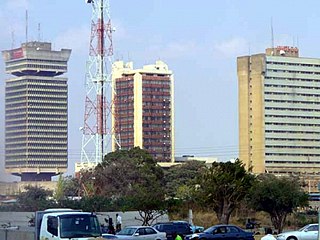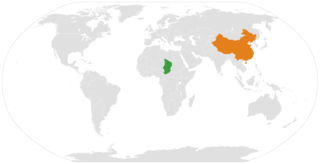
Namibia follows a largely independent foreign policy, with strong affiliations with states that aided the independence struggle, including Nigeria, Libya, and Cuba.

Though the Ministry of Foreign Affairs (MOFA) is the government agency responsible for the conduct of foreign relations of Nepal, historically, it is the Office of Prime Minister (PMO) that has exercised the authority to formulate and conduct policies related to Nepal's foreign affairs. As a landlocked country wedged between two larger and far stronger powers, Nepal has tried to maintain good relations with both of its neighbors, People's Republic of China and Republic of India. Nepal's relationship with China, India, and the United States has remained utmost priority for successive Nepali governments. The relationship between Nepal and India however was significantly hampered during the 2015 Nepal blockade by pro-Indian anti-Nepal protestors, where the Government of Nepal accused India of using "Russia-Ukraine" tactics to cause unrest along Nepal's southern border using ethnically Indian residents of Nepal. India strictly denied the allegation and said the unrest were solely due to Madheshi protesters. For the most part though, Nepal has traditionally maintained a non-aligned policy and enjoys friendly relations with its neighboring countries and almost all the major countries of the world.

China, officially the People's Republic of China (PRC), has full diplomatic relations with 179 out of the other 192 United Nations member states, Cook Islands, Niue and the State of Palestine. China has had the most diplomatic missions of any state.
Foreign relations of Qatar is conducted through its Ministry of Foreign Affairs. Arab states were among the first to recognize Qatar, and the country gained admittance to the United Nations and the Arab League after achieving independence in 1971. The country was an early member of OPEC and a founding member of the Gulf Cooperation Council (GCC). Diplomatic missions to Qatar are based in its capital, Doha.

Foreign relations of Saudi Arabia are the diplomatic and trade relations between Saudi Arabia and other countries around the world. The foreign policy of Saudi Arabia is focused on co-operation with the oil-exporting Gulf States, the unity of the Arab+ World+, Islamic+ solidarity, and support for the United Nations. In practice, the main concerns in recent years have been relations with the US, the Saudi Arabian–led intervention in Yemen, the Israeli–Palestinian conflict, Iraq, the perceived threat from the Islamic Republic of Iran, and the effect of oil pricing. Saudi Arabia contributes large amounts of development aid to Muslim countries. From 1986 to 2006, the country donated £49 billion in aid.

Zambia is a developing country, and it achieved middle-income status in 2011. Through the first decade of the 21st century, the economy of Zambia was one of the fastest-growing economies in Africa, and its capital, Lusaka, the fastest-growing city in the Southern African Development Community (SADC). Zambia's economic performance has stalled in recent years due to declining copper prices, significant fiscal deficits, and energy shortages.

After independence in 1964 the foreign relations of Zambia were mostly focused on supporting liberation movements in other countries in Southern Africa, such as the African National Congress and SWAPO. During the Cold War Zambia was a member of the Non-Aligned Movement.

China–Kenya relations refer to the bilateral relations between the People's Republic of China and Kenya. The two countries established relations in 1963, suspended ties temporarily in 1967, but ultimately re-established diplomatic relations in 1978. Since then, they have significantly expanded their economic and investment agreements, such that China is currently Kenya's largest trading partner. While the robust trade, investment, and Chinese-led infrastructure projects have benefitted Kenya's overall development and have been labelled by both governments as "win-win" collaborations, local media and foreign analysts have increasingly criticized both the potential consequences of Kenya's loans from China as well as Kenya's overall economic dependence on foreign capital and products. The most ambitious collaboration, the Standard Gauge Rail that was planned to connect Nairobi, Kenya, Uganda, South Sudan, and Rwanda using Chinese financing and contractors, has attracted even more controversy due to financial complications, questions on the legality of its tender process, and the alleged collateralization of Kenya's Mombasa port.

The diplomatic relationship between the United States of America and Zambia can be characterized as warm and cooperative. Relations are based on their shared experiences as British colonies, both before, after and during the struggle for independence. Several U.S. administrations cooperated closely with Zambia's first president, Kenneth Kaunda, in hopes of facilitating solutions to the conflicts in Rhodesia (Zimbabwe), Angola, and Namibia. The United States works closely with the Zambian Government to defeat the HIV/AIDS pandemic that is ravaging Zambia, to promote economic growth and development, and to effect political reform needed to promote responsive and responsible government. The United States is also supporting the government's efforts to root out corruption. Zambia is a beneficiary of the African Growth and Opportunity Act (AGOA). The U.S. Government provides a variety of technical assistance and other support that is managed by the Department of State, U.S. Agency for International Development, Millennium Challenge Account (MCA) Threshold Program, Centers for Disease Control and Prevention, Department of Treasury, Department of Defense, and Peace Corps. The majority of U.S. assistance is provided through the President's Emergency Plan for AIDS Relief (PEPFAR), in support of the fight against HIV/AIDS.

Russia–Zambia relations are the bilateral relations between Russia and Zambia.

Chad–China relations refers to the current and historical relationship between the Republic of Chad and the People's Republic of China. Bilateral relations were initially established in 1972 but were severed by China in 1997 due to Chad's recognition of the Republic of China (Taiwan). Relations resumed in August 2006 when Chad ended its relationship with Taiwan and pledged adherence to the One China Policy. The ties between the two nations are primarily economic, although there is some cooperation in security. The economic ties are profitable for both countries, with China providing aid and investment in exchange for natural resources to fuel its economic growth.

People's Republic of China – Zambia relations refers to the current and historical relationship between the People's Republic of China (PRC) and Zambia.

China–Tanzania relations are the foreign relations between China and Tanzania. China established diplomatic relations with Tanganyika and Zanzibar on December 9, 1961, and December 11, 1963, respectively. When Tanganyika and Zanzibar were united and became Tanzania on April 26, 1964, China extended its diplomatic ties to it.
Debt-trap diplomacy is a term to describe an international financial relationship where a creditor country or institution extends debt to a borrowing nation partially, or solely, to increase the lender's political leverage. The creditor country is said to extend excessive credit to a debtor country with the intention of extracting economic or political concessions when the debtor country becomes unable to meet its repayment obligations. The conditions of the loans are often not publicized. The borrowed money commonly pays for contractors and materials sourced from the creditor country.













